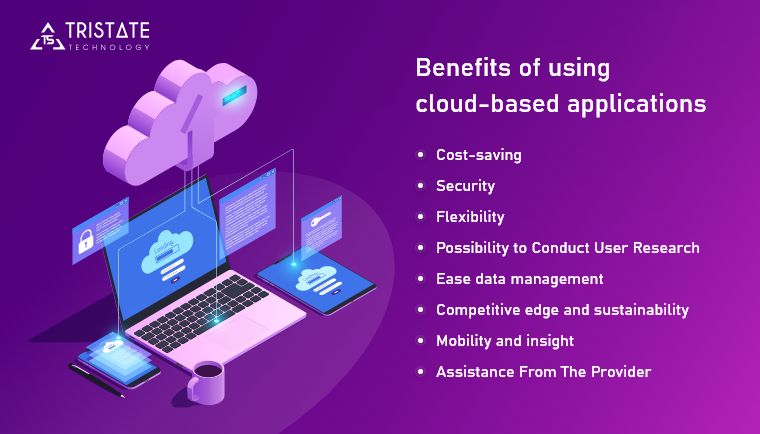Cloud computing has revolutionized the way businesses operate, offering a wide range of benefits and opportunities for organizations of all sizes. One of the key advancements in cloud technology is the availability of cloud-based software applications. These applications, hosted and delivered over the internet, provide numerous advantages over traditional on-premises software. In this article, we will explore the benefits of cloud-based software applications and how they are transforming the way businesses operate.
Accessibility and Flexibility
One of the primary advantages of cloud-based software applications is their accessibility and flexibility. These applications can be accessed from any device with an internet connection, allowing users to work remotely or collaborate seamlessly across geographies. Whether employees are working from home, traveling, or in different office locations, cloud-based applications enable them to access and use the software with ease. This flexibility enhances productivity, enables real-time collaboration, and promotes a more agile and connected work environment.
Scalability and Cost Savings
Cloud-based software applications offer unparalleled scalability, allowing organizations to scale their usage up or down as per their requirements. With traditional on-premises software, businesses often have to anticipate their peak usage and invest in expensive hardware and licenses upfront. In contrast, cloud-based applications can easily accommodate fluctuations in demand. Organizations can scale resources, such as storage and computing power, on-demand, paying only for what they use. This scalability reduces upfront costs and provides cost savings in the long run, making cloud-based applications a more cost-effective option for businesses.
Automatic Updates and Maintenance
Managing software updates and maintenance can be a time-consuming and resource-intensive task for businesses. With cloud-based software applications, updates and maintenance are handled by the service provider. These applications are regularly updated with the latest features, security patches, and bug fixes, ensuring that organizations always have access to the most up-to-date and secure version of the software. This eliminates the need for manual updates and frees up IT resources to focus on more strategic initiatives, rather than routine maintenance tasks.
Improved Collaboration and Data Sharing
Cloud-based software applications promote collaboration and seamless data sharing within organizations. With these applications, multiple users can access and work on the same files and documents simultaneously, eliminating version control issues and enabling real-time collaboration. This facilitates efficient teamwork, enhances communication, and streamlines workflows. Moreover, cloud-based applications often provide secure data sharing and collaboration features with external stakeholders, such as clients, partners, and vendors. This allows for easy and controlled sharing of information, leading to improved business relationships and streamlined project management.
Enhanced Data Security and Disaster Recovery
Data security is a top concern for businesses, and cloud-based software applications offer robust security measures to protect sensitive information. Cloud service providers employ advanced security protocols, such as data encryption, multi-factor authentication, and regular security audits, to ensure the safety of data stored in the cloud. Additionally, cloud-based applications provide automatic backup and disaster recovery capabilities. In the event of data loss or system failure, organizations can quickly restore their data from backups stored in secure data centers, minimizing downtime and mitigating the risk of data loss.
Integration and Compatibility
Cloud-based software applications are designed to integrate seamlessly with other cloud-based services and systems. These applications often provide APIs (Application Programming Interfaces) that allow for easy integration with existing software and systems, such as CRM (Customer Relationship Management), HR (Human Resources), and financial management tools. This integration enables organizations to create a unified and connected ecosystem, streamlining data flow, and eliminating the need for manual data entry and duplication across different systems. The compatibility of cloud-based applications with various platforms and devices further enhances their versatility and usability.
Case Studies: Real-World Examples
Let’s explore two case studies that highlight the benefits of cloud-based software applications in different industries:
- Company XYZ: CompanyXYZ is a medium-sized marketing agency that specializes in digital marketing services. The company decided to transition to cloud-based software applications to streamline their operations and improve collaboration among their dispersed team members. By adopting cloud-based project management, task tracking, and file sharing applications, Company XYZ experienced several benefits. Firstly, team members were able to access project information and collaborate in real-time, regardless of their physical location. This resulted in improved efficiency and faster project completion. Additionally, the cloud-based applications offered advanced security features, such as encrypted file sharing and user access controls, ensuring the confidentiality of client data.
- Company ABC: Company ABC is a retail company with multiple store locations. They implemented a cloud-based point-of-sale (POS) system to replace their outdated on-premises software. The cloud-based POS system provided them with several advantages. Firstly, it allowed for centralized management of inventory across all stores, providing real-time visibility into stock levels and facilitating efficient stock replenishment. The system also integrated with the company’s online store, enabling seamless synchronization of inventory and sales data. Furthermore, the cloud-based system offered built-in analytics and reporting capabilities, allowing Company ABC to gain valuable insights into sales trends, customer preferences, and overall business performance.
Conclusion
Cloud-based software applications have revolutionized the way businesses operate by providing accessibility, flexibility, scalability, cost savings, automatic updates, enhanced collaboration, improved data security, and seamless integration. The benefits offered by these applications are transforming industries across the board, from small startups to large enterprises. Organizations that adopt cloud-based software applications can leverage the power of the cloud to streamline their operations, improve productivity, and gain a competitive edge in today’s fast-paced business landscape. As technology continues to advance, it is clear that cloud-based software applications will play an increasingly significant role in shaping the future of businesses worldwide.
